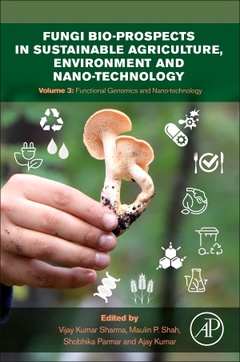Fungi Bio-prospects in Sustainable Agriculture, Environment and Nano-technology Volume 3: Fungal Metabolites, Functional Genomics and Nano-technology
Coordonnateurs : Sharma Vijay Kumar, Shah Maulin P., Parmar Shobhika, Kumar Ajay

Volume 3 provides a comprehensive account of fungal metabolites, including bioactive and host origin compounds, along with other biomolecules, and mycotoxins. This book includes the applications, limitations, and prospects of working with fungal secondary metabolites. The authors explore fungi in the myco-mediated synthesis of nanoparticles along with their biotechnological, industrial, and agricultural uses. This book also discusses advancements in medical mycology for the diagnosis and treatment of fungal infections. Furthermore, this book provides up-to-date and in-depth knowledge about the adoption of advanced CRISPR-Cas9 technology in fungi for gene editing
Dr. Maulin P. Shah is Chief Scientist and Head of the Industrial Waste Water Research Lab, Division of Applied and Environmental Microbiology Lab at Enviro Technology Ltd., Ankleshwar, Gujarat, India. His work focuses on the impact of industrial pollution on the microbial diversity of wastewater following cultivation-dependent and cultivation-independent analysis. His major work involves isolation, screening, identification, and genetically engineering high-impact microbes for the degradation of hazardous materials. His research interests include biological wastewater treatment, environmental microbiology, biodegradation, bioremediation, and phytoremediation of environmental pollutants from industrial wastewaters.
Dr. Parmar has a Ph.D. in Environment Science from from Govind Ballabh Pant University of Agriculture & Technology, Pantnagar, Uttarakhand, India. She has more than eight years of research experience, particularly in the area of toxic metal pollution of water bodies and soil, their phytoremediation,
- Covers the secondary metabolites of fungi including bioactive compounds, mycotoxins and other biomolecules
- Provides insight into the fungal mediated biosynthesis of nanoparticles and its various applications in diverse fields
- Describes advances in diagnosis and treatment of human fungal infections
- Presents the latest information on applications of the CRISPR-Cas9 system in fungi
Date de parution : 03-2021
Ouvrage de 610 p.
15x22.8 cm
Thème de Fungi Bio-prospects in Sustainable Agriculture... :
Mots-clés :
Active metabolites; Acute; Aflatoxin; Aflatoxins (AFs); Agriculture products; Amphotericin B; Anticancer; Antifungal agents; Antioxidant; Applications; Aspergillus; Aureobasidium pullulans; Bioactive compounds; Biocolor; Biodegradation; Biological applications; Biological synthesis; Biosynthesis; Biotechnology; CRISPR; CRISPR based screening; Carcinogenic; Cas9; Contaminate foods; Derivatives; Development; Diversity; Echinocandidns; Endophytes; Endophytic fungi; Enzymes; Euphorbia hirta (L); Exopolysaccharide; FDA; Fungal diagnosis; Fungal nanoparticles; Fungi; Fusarium nectrioides; Gene editing; Genome-editing; Globalization; Green nanotechnology; Green technology; Immunogenic; Immunosuppressive; Interventions; LAMP PCR; Large scale production; Liquid cheese whey and competition inhibition; MALDI-TOF; MT PCR; Marine endophytic fungi; Marine fungi; Mechanism; Mechanism of synthesis; Metabolite; Metabolites; Microorganism; Mutagenic; Mycoendophytes; Mycogenic; Myconanotechnology; Mycoses; Mycosnthesis; Mycotoxins; Nanoagriculture; Nanoparticle; Nanoparticles; Nanosensors; Nanotechnology; Plant growth; Plant stress tolerance; Pullulan; Regulatory standards; SM; Secondary metabolites; Silver nanoparticles; Synthetic color; T2 magnetic resonance; Voriconazole



